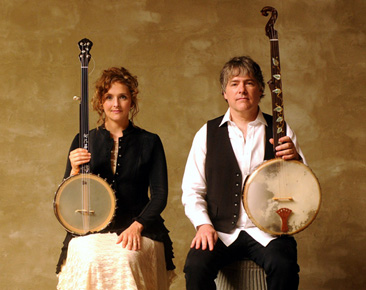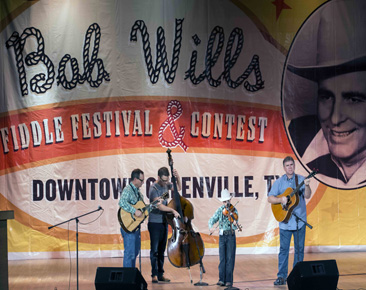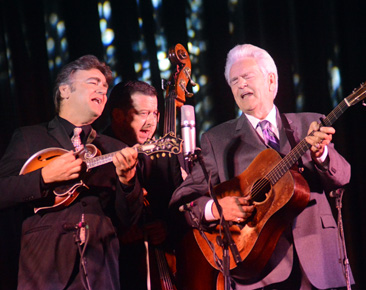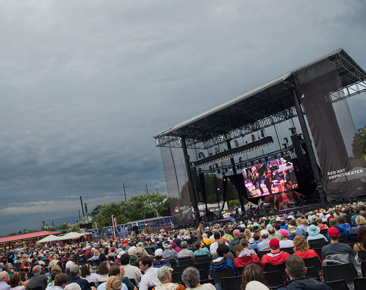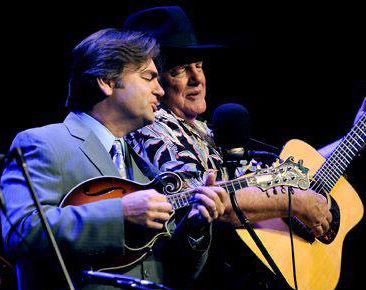
“Lost all my money but a two dollar bill
Two dollar bill, boys, two dollar bill
Lost all my money but a two dollar bill
I’m on my long journey home.”
Long Journey Home, as sung by Bill Monroe and the Blue Grass Boys
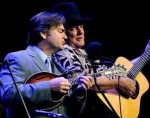 Peter Rowan and Ronnie McCoury stood alone on the stark stage, singing in close harmony and reverence to the night’s guest of honor, the omni-present spirit of the Father of Bluegrass himself, Bill Monroe. The spare opening duet of Long Journey Home was like a short black-and-white reel of 33mm film, a promise of what was about to happen, for after a couple of verses, the rest of the minstrels took the stage to transcend the sound into full-blown Technicolor – Travelin’ McCourys: Alan Bartram, Jason Carter and Rob McCoury, along with guitarist Cody Kilby stepping in for the ailing Tony Rice. The 100 Years of Bill Monroe Tribute Tour had rolled into the Jefferson Center in Roanoke, VA, on Friday night, November 30, and a capacity crowd of 900 souls had come for an evening of songs and stories of Bill Monroe. They were not disappointed.
Peter Rowan and Ronnie McCoury stood alone on the stark stage, singing in close harmony and reverence to the night’s guest of honor, the omni-present spirit of the Father of Bluegrass himself, Bill Monroe. The spare opening duet of Long Journey Home was like a short black-and-white reel of 33mm film, a promise of what was about to happen, for after a couple of verses, the rest of the minstrels took the stage to transcend the sound into full-blown Technicolor – Travelin’ McCourys: Alan Bartram, Jason Carter and Rob McCoury, along with guitarist Cody Kilby stepping in for the ailing Tony Rice. The 100 Years of Bill Monroe Tribute Tour had rolled into the Jefferson Center in Roanoke, VA, on Friday night, November 30, and a capacity crowd of 900 souls had come for an evening of songs and stories of Bill Monroe. They were not disappointed.
Neither was I – I found myself so engrossed by the amazing music presented in the first of two sets I nearly forgot I was there to review the show. Several songs of the first set held me captive before Uncle Pen shook me into the present with the reminder that I was there, after all, so I could share the music of the tour with readers of Bluegrass Today who have not yet been able to see the show for themselves.
The tour has been running off and on around the country for over a year now, to enthusiastic receptions wherever it appears. According to Peter Rowan, with whom we had the pleasure of visiting for a while before show time, the performances aim to showcase some of the best of Monroe’s music by playing tunes in their original chord structures and arrangements. This gives audiences the opportunity to hear the music from the hallowed poet in the way he intended it to be heard, even if it’s not always the easiest music to pull off.
“There’s a validity of the music itself, that’s because it actually has musical qualities that are timeless. Any great music has to have these qualities. It’s almost like math, like a grid, like a math. You know, except that bluegrass it’s like the horses are pulling the cart but they’re swerving a little bit. Yeah, it’s not like you can impersonate bluegrass. I have to breathe like Bill Monroe, I have to hit the notes that he did, and we have to do in the keys he wrote it because it’s kind of a classical music.
At our first few shows, I’d be so hyperventilated from breathing like he does, you know? Because you have to – You have to take a big, a big breath and sing in ranges that are difficult to sing in. And I just think as a challenge, as a musical challenge, it’s well worth it.”
Rowan, a member of Monroe’s Blue Grass Boys from 1964-1967 and a successful solo artist of some long standing, lent his clear dulcet tones on songs like On and On, In the Pines and Footprints in the Snow, often taking the high harmony part with Ronnie McCoury’s lead. Everyone had their moment in the sun, however; Bartram stepped out from behind his bass to sing Kentucky Waltz, Carter brought the Lester Flatt-written post-war melody, Will You Be Loving Another Man?, and Rob McCoury moved away from Monroe for just a moment to remember the Banjo Baron of Baltimore, Walter Hensley, who had died five days earlier. He dedicated a blistering rendition of Earl’s Breakdown to Hensley, counting him as a true influence to his own development as a player.
Highlights of the second set included Molly and Tenbrooks and I Hear a Sweet Voice Calling, but the crowd positively shrieked at the opening fiddle strains of Blue Moon of Kentucky and Body and Soul. Kilby led the band into a nice version of Cheyenne with a heady intro, but everyone took their turn with impressive drive and sharp attack, including the laid-back Rowan.
It was a mal-functioning tour bus, the Bluegrass Breakdown, as dubbed by the Blue Grass Boys in the mid-60’s, which brought The Walls of Time to life. Rowan told the audience the story of how the tune to be, as he had recounted to us a little earlier:
“That morning I was standing outside the bus, the bus had broken down and Bill came off the bus and walked up to me and said, ‘Listen good to this, Pete, and don’t ever forget it.’ And he’s the boss and I’m going, ‘Right on.’ I’m not going to forget it. So I got really excited and started to, I mean, the first two lines, ‘The wind is blowing cross the mountain and down o’er the valley way below.’ So from that on, I was just thinking about writing the song, it was just something we did every day.”
The performance of the song itself was almost mystical, with Carter laying out an elegant, fluid fiddle piece before Kilby and Rowan lifted the airy refrain to guitar glory, evoking the soul of Monroe and his music as if through the “walls of time” right there to the here-and-now of the present moment. Mesmerizing.
Ronnie McCoury next dedicated Roanoke and the show to the eminent Herschel Sizemore, mandolin legend, who was looking on from his seat in the house, before all the singers – Bartram, Carter, Rowan and Ronnie McCoury – gathered around a single microphone for a pair of quartet Gospel songs that brought such stillness to the hall, it seemed that no one was breathing so as not to miss anything. The group dedicated Wayfaring Stranger to “our friend Tony,” in a nod to the absent Mr. Rice, and then followed it with A Beautiful Life, which was punctuated by Rowan’s tenor and Carter’s bass lines. When the last harmonic note of A Beautiful Life floated away into the air, the auditorium absolutely erupted into screams and cheers, from the floor to the balcony.
It wouldn’t be a Monroe tribute without a few stories about the colorful performer, and the band took a few minutes to reminisce about their personal experiences with both the man and the icon before closing the set with I’m Going Back to Old Kentucky. By this time, people in the audience were clapping along, with some on their feet and many singing. They weren’t ready to go home yet. When the band pulled out Muleskinner Blues for the second encore, the crowd was in as fine form as were the musicians, and the evening ended on a high for everybody.
As bluegrass continues to move into the 21st century with both traditional sounds and its progressive newgrass brethren, there may come a day when some begin to wonder why there will always be some who will insist on playing the music of the one who started it all, Bill Monroe. For Rowan, it’s a no-brainer.
“There’s a musical code, just like a DNA code, it’s called Bluegrass. We’ve ended up calling it Bluegrass. But people may forget that Bill Monroe was actually a genius and this other genius Earl Scruggs and another genius who was the glue was Lester Flatt, they defined a certain kind of timing. So I think that’s why, one of the reasons it’s important on a formal level is that we’ve gotta keep it alive. You know, sure there are records, but there are a lot of pickers hanging out at some of these shows. Last night I went out in the parking lot and hung out with them a little bit and I know that they’re being fed and reminded what is great about the music, that Bill was the conduit for.”

